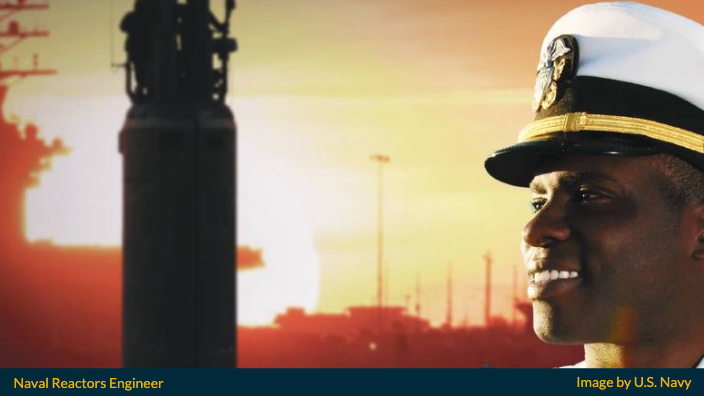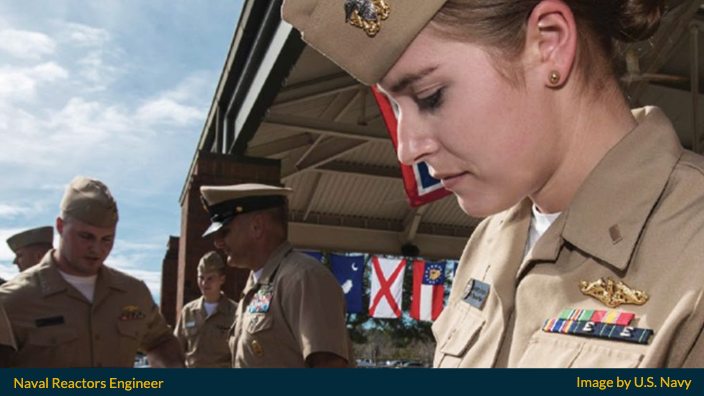Last Updated on March 4, 2024
This guide provides useful information that will help with your decision to become a Naval Nuclear Reactors Engineer during Fiscal Year 2024.
Naval Nuclear Reactor Engineers are Restricted Line Officers in the Navy who oversee all aspects of the Navy Nuclear Propulsion Program in Washington, D.C. The Navy Officer designator code for Naval Reactor Engineer is 1220.
As you will see, this program is very specialized and reserved for our country’s top talents.
Let us dive right in.
Nuclear Reactors Engineer Job Description

The world’s most powerful energy sources need the world’s most talented minds to power them.
Nuclear Reactors Engineers are in charge of developing, studying, maintaining, regulating, and operating the nuclear reactors and power plants that power the world’s most modern fleet of aircraft carriers and submarines.
They define and redefine the leading edge of nuclear propulsion, while also setting the standard in nuclear reactor regulation and research.
They command and manage the world’s most powerful fleet of nuclear-powered submarines and aircraft carriers.
Not only that, but they seek the most difficult academic and personal challenges in the nuclear sector.
They utilize engineering concepts in ways that not only aid to protect our national security, but also contribute to improve our planet.
Every day, they work to advance research via application and cooperation.
These personnel take on responsibilities and leadership positions that even their most competent counterparts have to wait years for.
Specific Responsibilities
Naval Reactors Engineers are in charge of the Navy’s full fleet of nuclear-powered ships, as well as shore-based prototypes and nuclear propulsion support facilities.
The Naval Nuclear Propulsion program involves a broad range of technological fields, including:
- Design of reactors and fluid systems
- Physics of reactors
- Material creation
- Design of components such as steam generators, pumps, and valves
- Instrumentation and control of reactors, steam plants, and power plants
- Testing and quality assurance
- Shielding
- Radiological and chemistry controls
They offer technical supervision while managing projects ranging from reactor design to fleet operations to de-fueling and decommissioning warships as a Navy Reactors Engineer stationed at the Naval Reactors Headquarters in Washington, D.C.
All Engineers chosen for Naval Reactors assignments are at the top of their class, forming a workforce of the country’s finest and brightest technical specialists.
Naval Reactors Engineers, even as entry level Nuclear Officers, are responsible for essential technical tasks in a range of cutting-edge facilities, including:
- Two Department of Energy labs
- Two nuclear prototype/training sites
- Almost a hundred nuclear-powered ships and submarines
- Six shipyards
- Over 1,000 companies that support the Naval Reactors program
Naval Reactors Engineers are in the fast-paced sector of nuclear propulsion.
They will often be in charge of many projects at the same time, taking the lead in everything from nuclear reactor design to refueling techniques to decommissioning of nuclear propulsion systems.
Whatever the precise tasks are, it is hands-on experience on a far higher level than what would generally be found in the private sector.
What to Expect
Preliminary training and final staff assignments are centered on the Navy Yard in Washington, D.C.’s Naval Reactors Headquarters.
At Headquarters, you will be part of an elite, streamlined team of around 500 people that supervise the whole Naval Nuclear Propulsion Program from start to finish.
The working atmosphere at Naval Reactors is both hard and rewarding, much like the nuclear propulsion sector itself.
You will undertake critical duties and cooperate with the ultimate think tank of nuclear engineers.
The path to that will take you from a post-graduate level study in academic settings through training on prototype units.
Aside from that, you may visit any of the program’s facilities, including site visits to nuclear-powered naval vessels, to watch and examine activities firsthand.
Working alongside industry leaders in a mostly civilian-like setting without having to wear a uniform every day may be intriguing to professionals in this sector.
Far more fulfilling is the importance of the job done here, both in and out of uniform, and the type of unparalleled experience it provides.
Whatever your responsibilities are and wherever they lead you, keep in mind that most of the work is highly classified and requires the highest discretion.
Post-Service Opportunities
What regularly distinguishes people with Nuclear Navy experience is a concentrated brain with the capacity to think outside the box.
They display unwavering dedication to answering questions that others find inexplicable and also leadership – whatever the task, whatever the shape.
The United States Navy promotes the development of people with intellect, character, and drive, and then channels that knowledge into real-world applications.
Their technical and leadership skills are well-developed.
After completing an initial four to five-year commitment, you might utilize your essential expertise to seek prestigious leadership, research, teaching, and consulting roles in the Navy.
Alternatively, you might pursue any of the other options available to former nuclear officers in the civilian market, which admittedly may be more financially lucrative.
How to Become a Naval Nuclear Reactors Engineer

To become a Naval Nuclear Reactors Engineer, applicants must be American citizens who are 19 to 29 years old at the time of commissioning with at least a bachelor’s degree in a qualifying technical field and a highly competitive grade point average (GPA).
Applicants must also have satisfactorily completed specific calculus-based courses to qualify.
Navy Nuclear Propulsion is a doorway to industry leadership and lifelong learning for qualified college graduates. Breakthrough research and high-level civilian participation.
Work that stretches well beyond the military to have an influence on the rest of the world.
All of the above is available to current undergraduate students who satisfy the required background, particularly those pursuing chosen areas such as mathematics, engineering, physics, or chemistry.
And after you graduate, you will be able to apply for a career as a recognized professional and Naval Officer with one of the world’s most successful nuclear programs.
Following the Naval Reactors Engineer course will provide you with an advanced education and expedited hands-on experience that you will not find anywhere else.
The specifics are listed below.
Naval Nuclear Reactors Engineer Basic Eligibility
| Citizenship | Applicants must be United States citizens. |
| Age | Applicants must be at least 19 years old and under 29 years old at the time of commissioning. Waivers may be considered on a case-by-case basis for individuals who will be under the age of 31 at the time of commissioning. |
| Gender | This program has no gender restrictions. |
| Marital Status | This program has no marital status restrictions. |
| Physical | In accordance with the Restricted Line criteria established in Chapter 15 of the Medical Department Manual. Prior to commissioning as a nuclear officer, program participants must satisfy the medical criteria for nuclear field duty/ionizing radiation. |
| Education | Candidates must be graduates or students seeking a BS or MS degree from an accredited college or university in the United States or a United States territory (majoring in engineering, mathematics, chemistry, physics, or other technical areas). Those still in school may apply as early as their junior year of college, and must have: Completed one academic year of college-level calculus Completed one academic year of college-level calculus-based physics Earned a competitive GPA and a minimum grade of “B” in all technical courses |
Also Read: Navy OCS Guide for Officer Applicants
NUPOC Interview
All students who apply to the Navy Nuclear Propulsion Officer Candidate (NUPOC) program are subjected to a stringent screening procedure before being chosen for a personal interview with the Director of Naval Reactors in Washington, D.C.
The first portion of the interview involves technical questions from calculus, physics, and other technical disciplines.
The bulk of the questions are from calculus and physics, but you may be questioned about other areas in your major as well.
This section of the interview usually lasts 30–40 minutes and includes two to four key questions every session.
The second round of the interview procedure included meeting with the Admiral in charge of the Naval Nuclear Propulsion program.
During this interview, the Admiral will go through your transcripts and technical interview assessments, as well as analyze your communication skills, interests, and enthusiasm for the program.
All potential Nuclear Officers are hand-picked by the Admiral.
VIP Tour
If you are a qualifying Nuclear Propulsion Officer candidate, the Navy provides a two-day VIP excursion to immerse you in this environment.
You will get the chance to explore the flight deck of an aircraft carrier or the torpedo chamber of a submarine. Interact with and question existing and potential Officers.
You will also learn about the Navy’s long history and its nuclear program.
This is your opportunity to see firsthand what it is like to start your career as a Nuclear Officer in the Navy.
Navy Nuclear Reactors Officer Training
Following graduation from college, the formal training procedure for becoming an Officer in the Naval Nuclear Propulsion program begins.
Officer Development School (ODS) — a five-week training in Newport, RI that gives a complete and intensive introduction to the duties of becoming a Navy Officer – is the first step for anyone interested in becoming a Naval Reactors Engineer.
Following the conclusion of ODS, newly commissioned Officers go to the advanced training that is at the heart of Navy Nuclear Propulsion.
Naval Reactors Engineers may anticipate to spend the next five years in charge of the Navy’s shore-based prototypes, shipboard nuclear power plants, and nuclear propulsion support facilities.
The rigorous training they get prepares them to work alongside some of the country’s finest and brightest technical specialists.
Preliminary Training: Naval Reactors Headquarters (NR)
Officers will spend the first four to five months of their careers at the Naval Reactors Headquarters in Washington, D.C., completing preparatory training.
This is followed by around two weeks of training at one of the Navy’s land-based prototypes in either Charleston, SC, or Albany, NY.
Naval Reactors Training Program (NRTP)
The next phase is a six-month postgraduate-level study in nuclear engineering at the Bettis Atomic Power Laboratory in Pittsburgh, PA, via the Bettis Reactor Engineering School.
Staff Assignment: Naval Reactors Headquarters (NR)
Following Naval Reactors Training, Naval Reactors Engineers are assigned to the group in charge of administering all technical elements of the Naval Nuclear Propulsion program, including designing, authorizing, and verifying the design, operation, and maintenance of approximately 100 nuclear reactors.
Engineers begin in a subordinate position, reporting to a supervisor, and quickly ascend to take on increased responsibility.
More Information
If you want more information about becoming a Navy Nuclear Reactors Engineer, the next logical step is to contact a Naval Officer Recruiter.
Let us start figuring out how you can benefit from becoming a Naval Reactors Engineer – or if it is even the right career move for you.
Others also read more information from our articles about other closely related Nuclear Officer jobs, such as the Nuclear Surface Warfare Officer program and the Navy Submarine Officer program.
You might also be interested to read:
Hope you found this helpful to your career planning.


